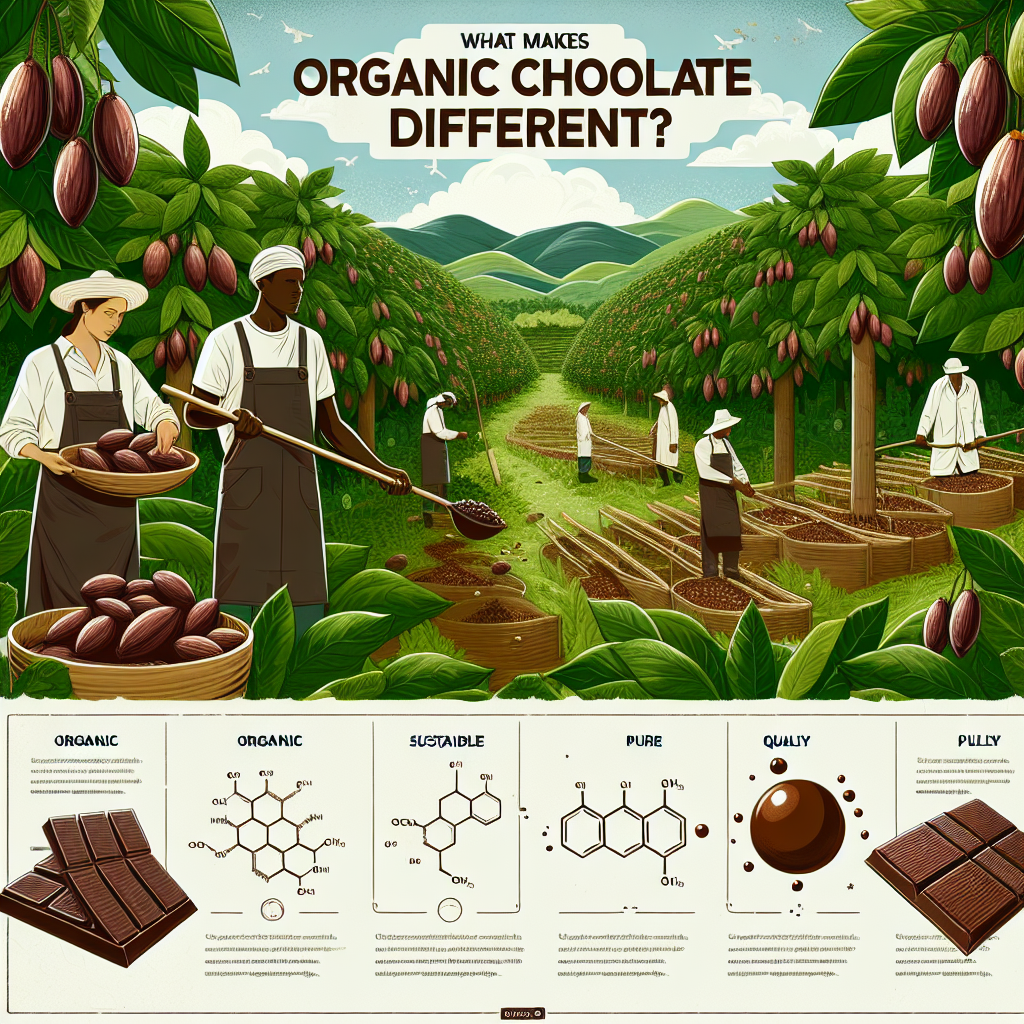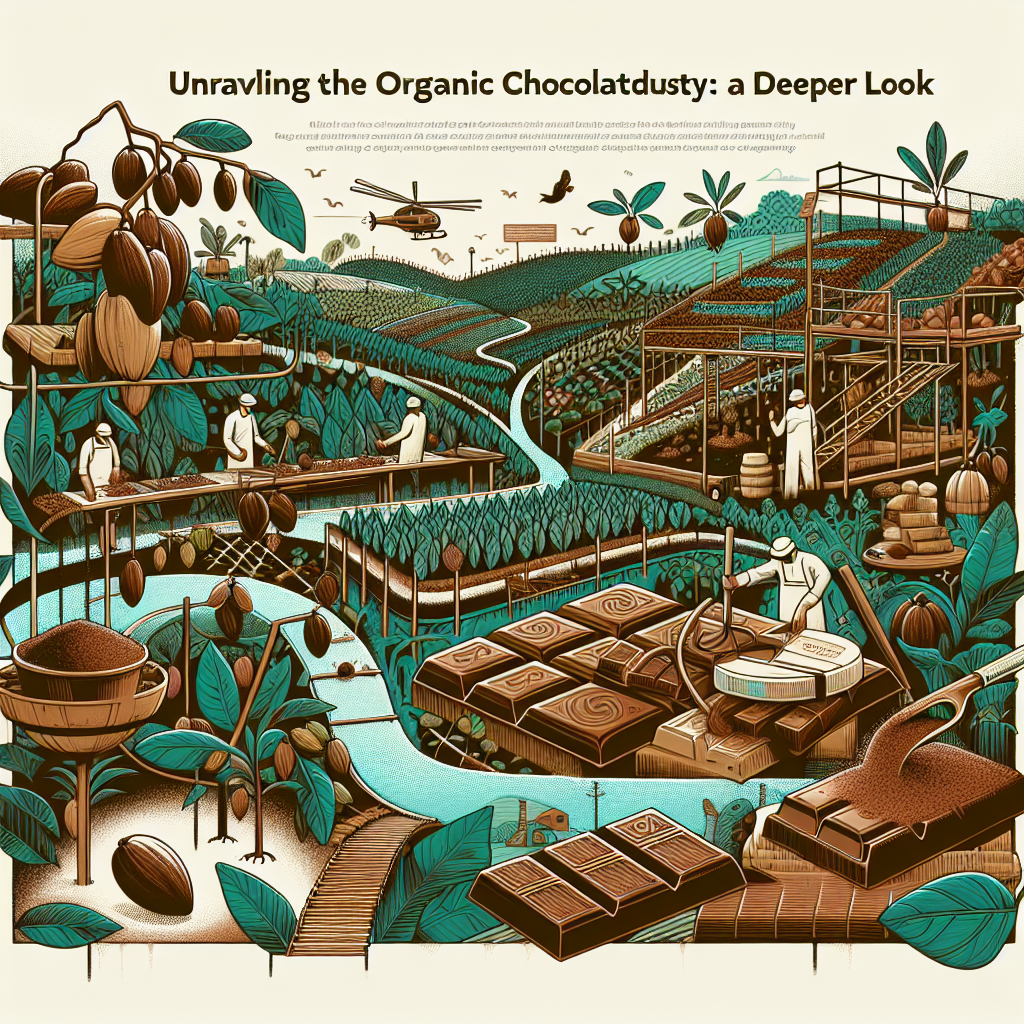What Makes Organic Chocolate Different?

Organic chocolate is made from cocoa beans that are grown without the use of synthetic pesticides, herbicides, or fertilizers. The term “organic” also extends to the other ingredients used in the chocolate-making process, such as sugar and milk if milk chocolate is being produced. To be certified as organic, the entire process from the farming of cocoa beans to the manufacturing of the chocolate must adhere to strict organic farming standards.
One of the main differences between organic and conventional chocolate is that organic chocolate often uses high-quality cocoa beans that are grown in a way that is more sustainable for the environment. For instance, organic cocoa farming typically involves practices that promote soil health, biodiversity, and reduce pollution. Conventional chocolate, on the other hand, may involve the use of genetically modified organisms (GMOs), synthetic chemicals, and farming practices that could harm the environment.
Environmental Benefits of Organic Chocolate
The environmental benefits of organic chocolate are significant. Because organic farming prohibits the use of synthetic pesticides and fertilizers, it reduces the amount of harmful chemicals that can leach into the soil and water systems. This helps to protect local wildlife and ecosystems. Additionally, organic farming practices often emphasize crop rotation and the use of natural compost, which helps to maintain soil fertility and structure over the long term.
Another important environmental benefit is that organic cocoa farms often employ shade-grown techniques. This means that cocoa trees are grown under a canopy of taller trees, which helps to preserve forest habitats and biodiversity. Shade-grown cocoa farms are also better at sequestering carbon compared to sun-grown cocoa farms where trees are often cleared to make way for monoculture plantations.
Biodiversity and Soil Health
Organic farming practices are designed to promote biodiversity. By avoiding monoculture and encouraging a diverse range of plant species, organic cocoa farms can support a variety of insects, birds, and other wildlife. This biodiversity helps to maintain a balanced ecosystem where natural predators can control pest populations, reducing the need for chemical pesticides.
Moreover, organic farming often includes the use of cover crops and organic matter such as compost and manure, which improve soil health. Healthy soil is rich in organic matter and microorganisms, which makes it more resilient to erosion and degradation. This is crucial for the long-term sustainability of cocoa farming.
Health Benefits of Organic Chocolate
Organic chocolate is often perceived as a healthier option compared to conventional chocolate. This is because it is made from ingredients that are free of synthetic chemicals and potentially harmful additives. However, the health benefits go beyond just the absence of harmful substances.
Organic chocolate typically contains a higher percentage of cocoa solids compared to many conventional chocolates. A higher cocoa content means that the chocolate is richer in antioxidants such as flavonoids, which have been linked to various health benefits such as improved heart health and reduced inflammation. Additionally, organic chocolate is less likely to contain artificial flavors, colors, or preservatives, making it a cleaner choice for health-conscious consumers.
Antioxidant Properties
The high levels of antioxidants found in organic chocolate, particularly dark chocolate, can help to reduce oxidative stress in the body. Oxidative stress is a condition where there is an imbalance between free radicals and antioxidants in your body, which can lead to cell damage and contribute to aging and diseases such as heart disease and cancer. The flavonoids in cocoa have been shown to help neutralize free radicals and protect cells from damage.
Another potential health benefit of organic chocolate is that it might contain fewer heavy metals like cadmium and lead. While all cocoa can contain trace amounts of heavy metals due to soil contamination, organic farming practices aim to reduce the use of contaminated fertilizers and pesticides, which could lower the risk of heavy metal exposure.
Top Organic Chocolate Brands
There are several reputable organic chocolate brands that have made a name for themselves in the market. Here are some of the top brands to consider:
- Green & Black’s: Known for its rich and creamy organic dark chocolate, Green & Black’s offers a wide range of organic chocolate bars made from high-quality, ethically sourced cocoa beans.
- Alter Eco: Alter Eco is committed to sustainability and fair trade. Their organic chocolate bars are made from single-origin cocoa beans and come in a variety of unique flavors, including quinoa crunch and blackout (a dark chocolate bar with 85% cocoa content).
- Endangered Species Chocolate: This brand not only offers organic chocolate but also donates a portion of its profits to wildlife conservation efforts. Their organic dark chocolate bars are made from ethically sourced cocoa and come in a variety of flavors such as dark chocolate with sea salt and almonds.
- Equal Exchange: A pioneer in the fair trade movement, Equal Exchange offers organic and fair trade certified chocolate bars made from cocoa beans sourced from small-scale farmers in Latin America and Africa.
- Tony’s Chocolonely: While primarily known for their commitment to tackling child labor and slavery in the chocolate industry, Tony’s Chocolonely also offers organic chocolate bars that are both delicious and ethically made.
Challenges in the Organic Chocolate Industry
Despite its many benefits, the organic chocolate industry faces several challenges. One of the main challenges is the higher cost of organic cocoa beans compared to conventional ones. Organic farming practices can be more labor-intensive and may yield lower crop volumes, which makes organic cocoa beans more expensive. This cost is often passed on to consumers, making organic chocolate pricier than its conventional counterparts.
Another challenge is the certification process. Obtaining organic certification can be a lengthy and costly process for farmers, which can be a barrier for small-scale farmers who might not have the resources to meet all the certification requirements. However, there are organizations that assist farmers in this process, such as Fair Trade International and the Rainforest Alliance.
Consumer Education and Awareness
Educating consumers about the benefits of organic chocolate is another important challenge. Many consumers may not be aware of the environmental and health advantages of choosing organic chocolate over conventional chocolate. Brands and organizations need to invest in marketing and educational campaigns to raise awareness and drive consumer demand for organic chocolate products.
Furthermore, there is a need for greater transparency in the chocolate industry. Consumers want to know where their chocolate comes from and how it was made. By providing this information, organic chocolate brands can build trust and loyalty among consumers who value ethical and sustainable practices.
Conclusion
The organic chocolate industry offers a more sustainable and potentially healthier alternative to conventional chocolate. By adhering to organic farming practices, it helps protect the environment, promote biodiversity, and provide consumers with a product that is free from synthetic chemicals. While there are challenges such as higher costs and the need for consumer education, the benefits make organic chocolate a worthy choice for those who are conscious of their health and the environment. As awareness grows, the demand for organic chocolate is likely to increase, encouraging more brands to adopt sustainable practices and making organic chocolate more accessible to consumers worldwide.
